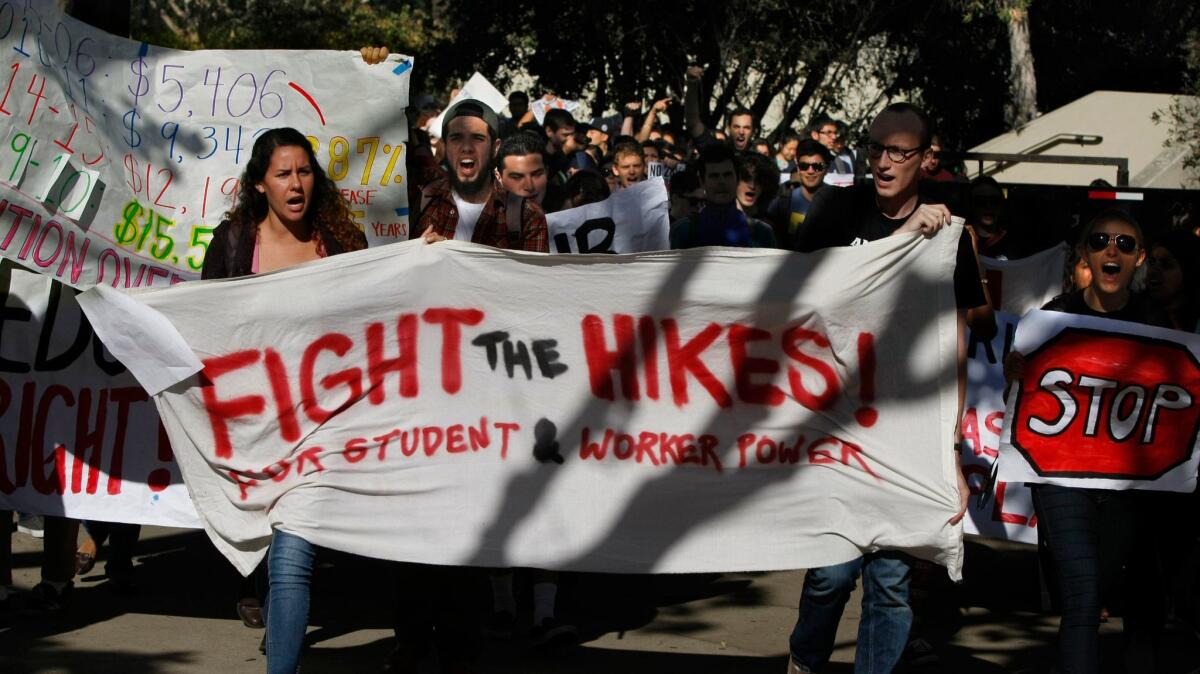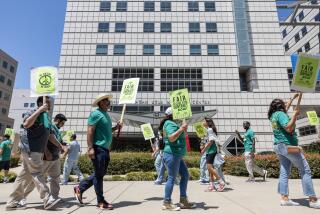UC regents face showdown with Gov. Brown over proposed increase in tuition and fees

Reporting from San Francisco — University of California regents face a showdown with Gov. Jerry Brown as they prepare to vote Wednesday on a plan to raise tuition and student services fees for the next academic year.
The proposed increase would amount to 2.7% — or $342 for state students.
Brown opposes any increase, though his 2018-19 budget proposal would give the 10-campus public research university system $34 million less than UC officials expected. In recent years, he has increased UC’s base budget by 4%. This year he is suggesting 3%.
He recently said UC officials must live within their means, cut costs and “more creatively engage in the process of making education more affordable.”
George Kieffer, chairman of the UC Board of Regents, said the governor’s proposed funding would not even keep up with inflation. He said in an interview that UC will need to raise more money to protect the university’s vaunted quality while it continues to find ways to cut costs.
“The governor is right that all of public higher education needs to adjust to new funding realities and public higher education is doing so,” he said. “We have a fiduciary duty to protect the university and students … [and] express what we believe the needs are for the crown jewel of the state.”
If regents vote to increase tuition despite Brown’s opposition, the governor could reduce UC’s state funding when he revises his budget plan in May.
H.D. Palmer, spokesman for Brown’s Finance Department, would not say whether the governor would take such action. But he said Brown told UC last May that he planned to reduce his annual increase to 3% the next year — and warned that any tuition increase could prompt “additional downward adjustments to state support” to cover the increases in Cal Grants for needy students that are automatically triggered by tuition hikes.
UC’s proposed increase would bring California students’ tuition and fees to $12,972 for 2018-19. Nonresident students would pay an additional $978 in supplemental tuition, bringing their total to $28,992.
The increase, if approved, would be the second consecutive. Last year’s hike followed six years when tuition did not rise. But UC officials say that increased financial aid would cover the higher costs for more than half of the system’s 180,000 California resident undergraduates who already pay no tuition. Those students also would receive about $100 more each for other expenses, such as housing, food and books.
Officials say the roughly $137 million that would be raised by the increase would pay for more financial aid, enrollment growth, faculty, courses, graduate student fellowships, mental health services, counseling and academic advising, technology upgrades, library support and building maintenance. The proposal to raise tuition and fees shelves a plan to increase contributions to the employee retirement fund.
Students plan to protest the proposed increase at the regents meeting at UC San Francisco. Some pushed for a delayed vote, to have more time to lobby Sacramento for additional support.
Kieffer said that Brown’s proposed increase of 3% would amount to only 1.3% more for UC’s core educational budget. State funding covers just 45% of that budget, he said, and inflation grew by 2.5% last year.
According to Palmer, the state has increased UC funding by $1.2 billion since 2012. But UC officials contend that the money available per student from state contributions, tuition and fees, and general university funds has declined by about $11,000, or 31.2%, in constant dollars since 2000. Over that time, UC has seen its costs grow for financial aid, pension costs and record enrollment increases of 90,000 students.
“We’re losing the battle,” Kieffer said. “I support [a tuition increase] because the chancellors have asked for it and are making cuts with all sorts of efforts to reduce expenditures.”
Last year, he said, UC campuses collectively saved $300 million by ordering goods and services as a system. Officials also are saving money by reducing pension benefits for new employees and working to help students graduate more quickly, he said.
During their meeting, regents also are expected to vote on reforms to prevent UC employees from interfering in state audits of the Office of the President, as two top aides were found to have done last year. They also will consider new policies to prevent campuses from improperly rescinding admission offers, as UC Irvine did last summer.
Twitter: @TeresaWatanabe
More to Read
Sign up for Essential California
The most important California stories and recommendations in your inbox every morning.
You may occasionally receive promotional content from the Los Angeles Times.










